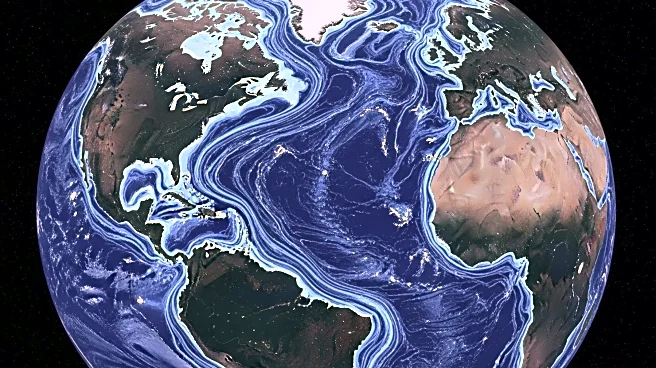What's Happening?
A recent study published in Environmental Research Letters has raised alarms about the potential collapse of the Atlantic Meridional Overturning Circulation (Amoc), a critical ocean current system. According to the study, the tipping point for the shutdown of Amoc could occur within the next 10 to 20 years, driven by global warming. This finding is based on observations in the North Atlantic, which have shown a downward trend over the past five to ten years. The study suggests that even under intermediate and low-emission scenarios, Amoc could slow drastically by 2100 and completely shut off thereafter. Scientists, including Prof Stefan Rahmstorf from the Potsdam Institute, emphasize the urgency of reducing emissions to prevent this collapse.
Why It's Important?
The potential collapse of Amoc poses significant risks to global climate patterns and sea levels. Amoc plays a crucial role in regulating climate by distributing heat across the planet. Its collapse could lead to extreme cold winters and summer droughts in western Europe, shift tropical rainfall belts, and contribute to rising sea levels by an additional 50cm. These changes would have profound impacts on agriculture, water resources, and coastal communities, affecting millions of people worldwide. The study underscores the need for immediate action to mitigate climate change and prevent catastrophic environmental consequences.
What's Next?
The study calls for urgent measures to cut down emissions to avert the collapse of Amoc. Policymakers and environmental groups are likely to intensify efforts to implement climate action plans and promote sustainable practices. The findings may also influence international climate negotiations, pushing for more aggressive targets to reduce greenhouse gas emissions. Continued monitoring of ocean currents and climate models will be essential to assess the risk and develop strategies to address potential impacts.
Beyond the Headlines
The potential collapse of Amoc highlights the interconnectedness of global climate systems and the far-reaching effects of human activities on the environment. It raises ethical questions about the responsibility of current generations to protect future generations from climate-related disasters. The study may also prompt discussions on the need for technological innovations and investments in renewable energy to reduce dependency on fossil fuels.










